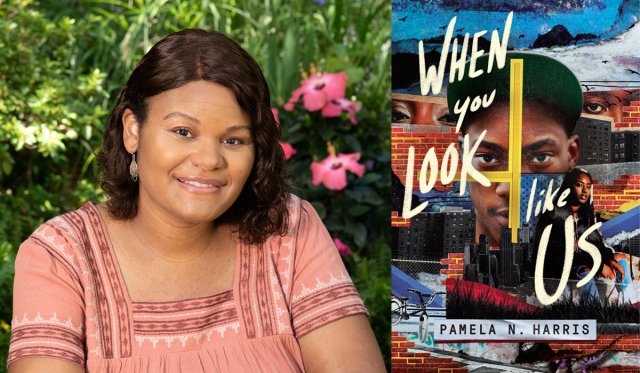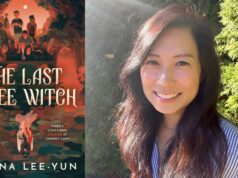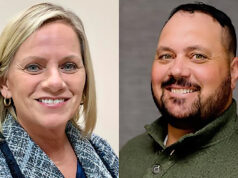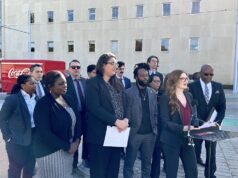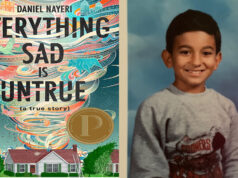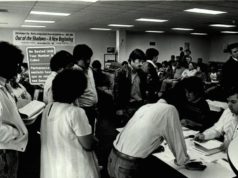(Editor’s note: NonDoc’s Author Umbrella interviews up-and-coming writers, particularly authors of color, authors of disability and LGBTQ+ authors. The interviews have been transcribed and lightly edited for length and clarity.)
For this week’s installment of our Author Umbrella series, I interviewed Pamela N. Harris, author of the novel When You Look Like Us. Her highly acclaimed debut, published by HarperCollins Books, hit bookstores on Jan. 5.
Here’s a short synopsis:
From debut author Pamela Harris comes a timely, gripping teen novel about a boy who must take up the search for his sister when she goes missing from a neighborhood where black girls’ disappearances are too often overlooked. Perfect for fans of Jason Reynolds and Tiffany D. Jackson.
When you look like us—brown skin, brown eyes, black braids or fades—everyone else thinks you’re trouble. No one even blinks twice over a missing black girl from public housing because she must’ve brought whatever happened to her upon herself. I, Jay Murphy, can admit that, for a minute, I thought my sister Nicole just got caught up with her boyfriend—a drug dealer—and his friends. But she’s been gone too long. Nic, where are you?
If I hadn’t hung up on her that night, she would be at our house, spending time with Grandma.
If I was a better brother, she’d be finishing senior year instead of being another name on a missing persons list.
It’s time to step up, to do what the Newport News police department won’t.
Bring her home.
Hi, Pamela! So, your debut novel has been out since January, and I read in your interview with Shondaland that you were pregnant last year. What has the process of releasing a debut during a pandemic — while balancing the million gazillion responsibilities of being a mom — been like?
It has been, to sum it up briefly, chaotic and exhilarating all at once. I love every second of having my book baby out in the world, and I, of course, love every second of having my real babies with me every day. However, I would have loved for all my babies to be born and thriving during a time without a global pandemic.
I have to say, it was also extremely heartbreaking and daunting for the events on Jan. 6 to have taken place only a day after my book was released into the world.
But I remind myself of all the joy I’ve experienced: my baby girl being born last September, my toddler son experiencing milestones, and, of course When You Look Like Us debuting. Remembering the highlights is key, as well as focusing on my word for 2021: “balance.”
WHEN YOU LOOK LIKE US…anything is possible. It’s heeeeerrrrre! Thanks so much for the love! To order a copy, check out https://t.co/WokABkXJ4z pic.twitter.com/XusqEvpsDG
— Pamela Harris (@pamharriswrites) January 5, 2021
When You Look Like Us follows Jay Murphy, a Black teen attempting to unravel the mystery of his sister’s disappearance and bring her home, in a neighborhood where missing Black girls are often overlooked. Reading the book, I was engrossed. It’s a fast-paced thriller that is as infuriating as it is compelling, because it illustrates the neglect Black girls face when it comes to social justice. What key lessons do you hope readers take away from reading the book?
First of all, thank you so much for those kind and thoughtful words about my book! I hope that readers gain a better understanding of systemic racism — both through the obstacles Jay faces to find his sister and through seeing how often Black girls go missing without being prioritized in American society. Additionally, I would want readers to take away the importance of familial relationships and how those connections (or lack thereof) impact us throughout our lives.
Your book is set in Newport News, Virginia, where you grew up, and, in many ways, I felt like the setting was a richly developed character in itself. What made you choose your hometown as the setting, and how do you think your experiences influenced the way in which you shaped Jay and Nicole’s neighborhood?
It’s so funny that you ask this question, because writing setting is something that I generally struggle with when I work on drafting. So, first, thank you! Second, originally, When You Look Like Us was supposed to be set somewhere completely different. Chicago, in fact. However, after I met with the editors, we talked about what it was like for me growing up. I told them about my old neighborhood, and everything clicked into place. I would say my experiences living in that neighborhood shaped Jay and Nic’s surroundings. I borrowed traits from my friends, family, and neighbors. And I included several of the landmarks that are prominent in my memory from growing up in Newport News. People who are from the area will definitely (at least I hope) recognize the locations.
Of course! WYLLU is set in my hometown, Newport News, VA. There’s a character who loves the Cowboys, a wink to my uncle who’s also obsessed with that team. There’s also something my mom says a lot that Jay teases his grandma about early in the book. #the21ders #debutauthorchat pic.twitter.com/slBI8zDVjC
— Pamela Harris (@pamharriswrites) December 21, 2020
Can you describe your journey to publication? I’ve read that you were with your agent for 10 years before selling your debut. What advice do you have for young writers to stay motivated during the writing process?
Yes, I was with my former agent for around 10 years before we sold my debut novel. However, we had several close calls along the way. In fact, the editor that bought When You Look Like Us was interested in two other novels earlier in my writing career.
I’ve been writing since I could pick up pen and paper, but I’ve been writing seriously for a little over 12 years now, and I would say perseverance and having a positive mindset are two of the most important things a writer can have.
Publishing is a long process, and it is important to be patient and to not get bogged down in the rejections and minor setbacks that come along the journey. I gathered a lot of both, but I’m still here!
You have a Ph.D. in counselor education and worked as a school counselor for several years. How did your experiences in the education system influence your approach to When You Look Like Us?
I have worked with children and adolescents for almost half of my life, and they’ve influenced how I write and what I write. I remember Black students coming into my office and complaining about the stories they were forced to read, because it didn’t represent them and their experiences. They reminded me that I had the same problem growing up. The only difference is, when I was little, I felt powerless and reading about white kids was the way of life. As I became older, I realized I could do something about it. A lot more authors of color had that same “ah ha” moment, and now I’m fortunate that both my children and I have so many diverse stories to read.
What is a quirky, interesting, random fact that your readers may not know about you yet?
My readers may not know that I was very much into dancing when I was younger and performed in some talent competitions. I can still bust a move when warranted — granted, with creakier knees!
The other day, I was watching music videos, because my son adores music, and I was able to pick up some of this girl group’s choreography after watching it once. When I was little, I thought I was going to become Janet Jackson’s choreographer. Maybe I missed my calling.
What elements of When You Look Like Us do you think would most appeal to OKC readers?
I know that OKC has a rich culture and, perhaps, an even richer Black culture. There are many people [in OKC whose] stories, neighborhoods, and histories … have not been told or seen that might see themselves in the pages of When You Look Like Us. At least that’s my hope!








